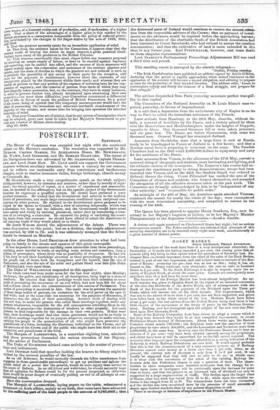POSTSCRIPT.
SATURDAY.
The House of Commons was occupied last night with the continued debate on Mr. Herries's resolution. The resolution was supported by Mr. HUDSON, Captain Halms, Sir ALEX./a4DER HOOD, Mr. NEWDEGATE, Mr. WAWA Lord INGESTRE, and Mr. ROBERT HILDTARD. The repeal of the Navigation-laws was advocated by Mr. Gnat:mix:inn, Captain BERKE, LEY, and Lord JOHN HAY. Mr. CLAY could not support the. Government measure without auxiliary measures, to create a uursery for our seamen, and to relieve our mercantile navy from restrictions and burdensome charges, such as marine insurance duties, foreign brokerage, church-money at Cronstadt, &c.
Mr. GLaneroNE made a very comprehensive speech on the whole subject; distingnithed, however, by closeness and neatness, rather than by novelty of argu- ment: the broad question of repeal, as a matter of expediency and seasonable- ness, he decided in the affirmative; but on the specific subject of the Government measure he expressed a. qualified opinion. He should have preferred a more gradual measure. He wished that the Government had adhered to the uniform course of precedents, and made large concessions conditional upon reciprocal con- cessions by other powers. He objected to the discretionary power proposed to be lodged in the, Queen in Council, with a view of extorting reciprocity, which was a cbseretion too large and too delicate; and the Government would have acted more safely and wisely by undoing piecemeal,. rather than by introducing a mea- sure of so sweeping a character. He censured the policy, of excluding the coast- ing trade from this measure: we should have offered to admit the Americans to our coasting trade if they would admit us to theirs. Sir Joint WALSH moved the adjournment of the debate. There was some disputation on this point; but on a division, the simple adjournment was carried, by 236 to 73; and it was ultimately arranged that the debate should be resumed on Monday,.
In the other Houie, Lord Baouomtse drew attention to what had been going on lately in the streets and squares of this great metropolis.
It was impossible to conceive anything more intolerable than those ptoceedings, anything more hurtful to trade, or anything more useless and vexation; than a system of processions, where there was no possibility of discussion. He had felt it his duty to call their Lordships' attention to these proceedings, merely to show the people out of doors, both the wrongdoers and the injured, that the eye of Parliament, and also the eye of his noble and gallant friend near him the Duke of Wellington), were upon them. The Duke of WELLINGTON responded to this appeal— The whole town had been under arms for the last four night; since Monday; the troops,. the police, and inhabitants of all descriptions, being kept in a state of readiness. He trusted that their Lordships would turn their attention to some mode of preventing the recurrence of an evil which had now been felt for about half-a-dozen times since the commencement of this session of Parliament. Two males of preventing it occurred to him.. One mode was to prevent the assembly of these large bodies of persons,, too numerous for the civil power on the spot to deal with; and at the same time too numerous for the purposes of discussion, if discussion was the object of their assembling. Another mode of dealing with this evil was, to make the persons who called these meetings together, under any pretext whatsoever, responsible for the evil consequences attending them in the spoliation of property—the destruction of windows or other property. Let such persons be beld responsible for the damage in their own pockets. If that were done, their Lordships would find that these gentlemen would not be so.ready to call these meetings together for no purpose whatever, excepting to make orations, exciting the people to the assassination of all who might have promoted the punishment of a felon, including the illustrious individual on the Throne, and all the savants of the Crown and of the public who might have lent their aid to the conviction and punishment of the felon. The Marquis of LANSDOWNE°, in a somewhat slighting tone,, admitted that these processions demanded the serious attention of her Majesty, and the advice of Parliament.
. The Duke of RICHMOND advised some activity in the matter of prosecn- bons and indictments. Lord DENMAN held that speeches inciting the hearers to felony might be visited by the severest penalties of the law.
As an old Reformer, he would earnestly diesuadb his fellow eonottymen from in those questionable proce.edingsv to get up petitions and agitate the Pa mind at a period like the present, would do more injury than service to the cause of Reform. As an old friend. and wellwisher, he should earnestly hope that all agitation for Reform would be for the present suspended, as otherwise there would be great danger of eventually putting an end to all attempts at con- stitutional reform.
Here the conversation dropped.
The Marquis of LANSDOWNE, laying papers on the table, volunteered a statement on Irish affair; mainly to set forth, that sums have been advanced for the suffering part of the Irish people to the amount of 8,78&1,0001.; that the distressed parts of Ireland would continue to receive the utmost atten- tion from the responsible advisers of the Crown; that no payment of instal- ments on the advances would be required before the approaching harvest; that the distribution of the charitable funds of the British Association had been intrusted to Count Sztreletski, who had refused to accept the smallest remuneration; and that the cultivation of land is more extended in this than in any former year. Earl FITZWILLIAM, however, cast some doubt on these sanguine representations.
Lord STANLEY'S Parliamentary Proceedings Adjournment Bill was read a third time and passed. '


























 Previous page
Previous page